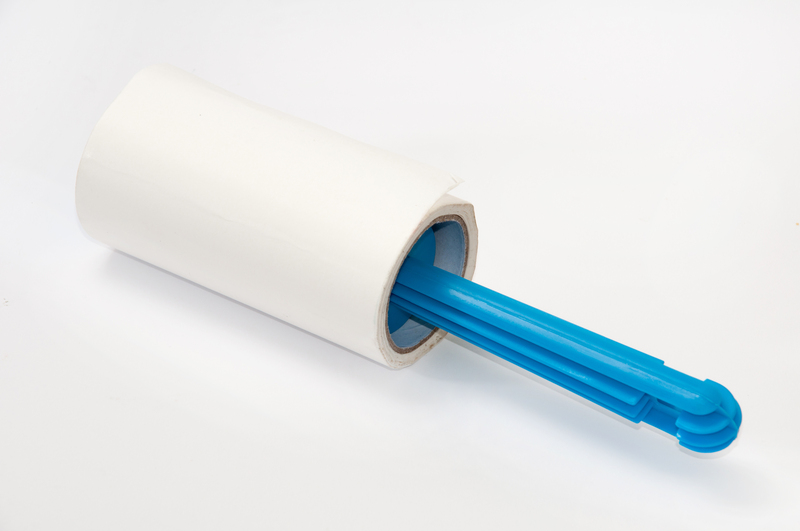Timeless Glimmer: Tips for Cleaning Jewellery
Posted on 11/09/2025
Timeless Glimmer: Tips for Cleaning Jewellery
Jewellery carries stories, memories, and a brilliance that captivates the eye. But over time, even the most precious pieces can lose their sparkle due to dust, oil, and daily wear. If you're yearning to revive the timeless glimmer of your collection, you're in the right place. This comprehensive guide dives into essential tips for cleaning jewellery, catering to gold, silver, gemstones, and even costume favourites. With easy, at-home advice paired with professional secrets, give your treasures the care they deserve--and keep them dazzling for generations.
Why Cleaning Your Jewellery Matters
Whether it's an heirloom ring, a delicate pendant, or everyday earrings, keeping your jewellery clean preserves both its beauty and integrity. Oils from skin, lotions, and dust can accelerate tarnish, compromise settings, and even dull gemstones. Regular maintenance helps to:
- Maintain sparkle: Dirt and oil cloud the natural shine.
- Protect settings: Grit and debris can loosen stones.
- Prevent wear: Corrosion and tarnish can damage pieces if untreated.
- Ensure hygiene: Clean jewellery prevents bacteria build-up, especially for pierced pieces.

General Jewellery Cleaning Tips
Before diving into specific techniques, it's crucial to understand universal best practices. Cleaning jewellery isn't just about regaining luster--it's also about preserving the quality of various materials. Keep the following tips in mind for a safe cleaning process:
- Assess the material: Always identify whether your piece is gold, silver, platinum, diamond, gemstone, or costume.
- Test for loose stones: Gently shake or inspect pieces to ensure stones are secure before cleaning.
- Avoid harsh chemicals: Many household cleaners can damage settings or stones.
- Use soft implements: Always opt for gentle brushes, lint-free cloths, and non-abrasive wipes.
- Dry thoroughly: Residual moisture can cause tarnish or water spots.
How to Clean Gold Jewellery: Restore Gloss and Glisten
Gold is cherished for its timeless radiance, but it's more delicate than it appears. Cleaning gold jewellery at home is simple with the right approach:
DIY Gold Cleaning Solution
- Mild soap and water: Mix a few drops of gentle dish soap with warm water.
- Soak: Immerse your gold pieces for 10-20 minutes to loosen grime.
- Gently brush: Use a child's soft toothbrush to clean crevices.
- Rinse and dry: Rinse with lukewarm water and pat dry with a lint-free cloth.
Avoid: Toothpaste, abrasive scrubbing, and harsh chemicals that can scratch gold or remove plating.
Reviving Silver Jewellery: Banishing Tarnish
Silver's luminous finish can fade under tarnish caused by sulfur compounds in the air. Follow these tips for effective silver jewellery cleaning:
Homemade Silver cleaning paste
- Mix three parts baking soda to one part water to form a paste.
- Apply gently with a soft, damp cloth, rubbing lightly to avoid micro-scratches.
- Rinse thoroughly and polish with a microfibre cloth for a brilliant sheen.
Tip: For intricate pieces, use a soft-bristle brush and avoid submerging pieces with stones or glue.
Avoid: Paper towels (which can scratch), silver dips for antique or stone-set jewellery, and placing in the dishwasher.
Caring for Gemstone Jewellery: Safe, Gentle Sparkle
Gemstones like emeralds, rubies, opals, sapphires, and pearls each have their own sensitivities. Cleaning gemstone jewellery requires a tailored approach:
- Check settings: Ensure stones are well set.
- Use mild solutions: Lukewarm water with a drop of dish soap suits most stones.
- Brush delicately: A soft brush or cloth helps avoid scratches.
- Avoid hot water or steam: Sudden temperature changes can fracture stones.
- Never soak porous gems: Opals, turquoise, and pearls should not be left in water; gently wipe instead.
Bonus tip: Pearls acquire a better luster the more they're worn--but always clean with a damp cloth after use to remove skin oils.
Polishing Platinum and White Gold Jewellery
Platinum and white gold provide a modern, cool-toned shine--yet dirt and oils can dull their surface. For polishing platinum and white gold:
- Soak in warm, soapy water for 15 minutes.
- Lightly brush with a soft toothbrush.
- Rinse and buff with a clean, dry cloth.
- For stubborn marks, visit a professional jeweller for machine polishing.
Note: White gold often has a rhodium plating. If the piece looks yellowed after cleaning, it may need to be re-plated.
Costume Jewellery Care: Keep Fashion Finds Sparkling
Costume and fashion jewellery brings personality and fun, but it's even more prone to tarnish and discoloration because of the materials used. Tips for cleaning costume jewellery:
- Never soak costume jewellery--moisture can weaken adhesives and cloud stones.
- Wipe gently with a barely damp, soft cloth to remove oils.
- Use a dry, soft brush for detailed areas.
- Store pieces individually to avoid tangling and scratching.
Avoid: Chemical dips, silver cleaners, or ultrasonic cleaners, which can easily damage base metals and coatings.
Using Ultrasonic Cleaners: When and How
Ultrasonic cleaners are devices that use high-frequency sound waves in a liquid to shake off debris. While incredibly effective for jewellery cleaning, they're not suitable for all items:
- Safe for: Diamond, most sapphires, rubies, and gold (without fragile settings).
- Unsafe for: Pearls, opals, emeralds, turquoise, antique or glued jewellery, enamel, and pieces with loose or fractured stones.
Always follow the manufacturer's instructions and, if unsure, consult a professional before using an ultrasonic cleaner.
Professional Jewellery Cleaning: When to Seek Expert Care
Not all cleaning needs can or should be met at home. If your jewellery features intricate settings, is particularly valuable, or shows signs of heavy tarnish or damage, take it to a professional jeweller. Services may include steam cleaning, ultrasonic baths, professional polishing, and careful inspection for loose stones or worn prongs.
Signs you need professional cleaning:
- Visible dirt or grime persists after home cleaning.
- Loose stones or creaking settings.
- Major tarnish, corrosion, or color changes.
- Highly sentimental or antique value.
Safely Storing Your Jewellery: Prolong the Sparkle
Proper storage is essential to maintaining that timeless glimmer. Here's how to prevent dullness, tarnish, and accidental damage:
- Keep pieces in separate compartments or cloth bags to reduce friction.
- Use anti-tarnish strips or silica gel packets for silver jewellery.
- Store pearls flat, never hanging, to avoid stretching the silk thread.
- Remove rings and bracelets before heavy chores, workouts, or swimming in chlorinated pools.
Common Jewellery Cleaning Mistakes to Avoid
Even with the best intentions, missteps in the cleaning process can damage your favourite accessories. Avoid these common pitfalls:
- Using strong chemicals: Products like bleach, ammonia, or acetone can erode metal and discolor stones.
- Scrubbing with abrasives: Toothbrushes with hard bristles or rough cloths may scratch soft metals.
- Prolonged soaking: Especially dangerous for pieces with glued stones or porous materials.
- Not checking settings: Cleaning without checking for loose stones may result in lost gems.
- Hot water baths: Many gemstones, especially opal and turquoise, can crack or lose color from heat exposure.
Eco-Friendly Jewellery Cleaning Solutions
For those seeking greener alternatives, many jewellery cleaning options are both effective and environmentally friendly:
- Baking soda and vinegar: Gently cleans tarnished silver (but avoid on soft stones).
- Lemon juice and olive oil: Works for removing tarnish from brass or copper jewellery.
- Plant-based soap: Opt for biodegradable, fragrance-free dish soap for routine cleaning.
Remember--always conduct a spot test before applying a new solution to your precious jewellery.

Frequently Asked Questions About Cleaning Jewellery
How often should I clean my jewellery?
For pieces worn daily, a gentle cleaning once a month is typical. Heirlooms or less-used items may simply need an annual professional polish or as-needed touch-ups.
Can I clean all jewellery with soap and water?
While mild dish soap and warm water are safe for most yellow gold and certain hard gemstones, they're not suitable for pearls, opals, or vintage costume pieces. Always assess your jewellery before choosing a cleaning method.
Is ultrasonic cleaning safe?
Ultrasonic devices are great for diamond and strong gemstones, but fragile and organic materials can be damaged. When in doubt, visit a professional.
What should I do if my jewellery turns green or black?
Green or black coloring is often due to a reaction between skin acids and alloys in the metal. Clean thoroughly with baking soda paste or seek expert advice for stubborn cases.
Conclusion: Enjoy Your Jewellery's Timeless Glimmer
Jewellery is more than just adornment--it's a reflection of cherished moments and personal style. With these comprehensive cleaning and care tips, you can ensure your treasures retain their timeless glimmer and remain radiant for years to come. For best results, tailor your cleaning routine to the type and delicacy of each piece, and don't hesitate to seek professional help for valuable or antique items.
Keep your collection sparkling, show off your shine, and let your jewellery tell its dazzling story--now and always.
Latest Posts
Daily Routines to Ensure a Dust-Free, Allergy-Friendly Home
Secrets to Professional Car Detailing for Enthusiasts
Keep Your Window Sills Spotless by Fighting Mould Issues



